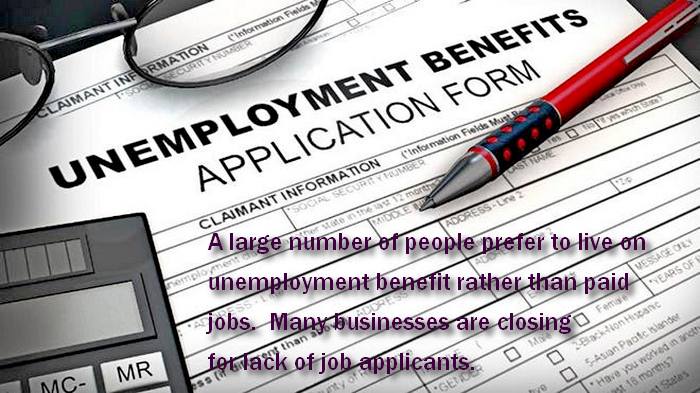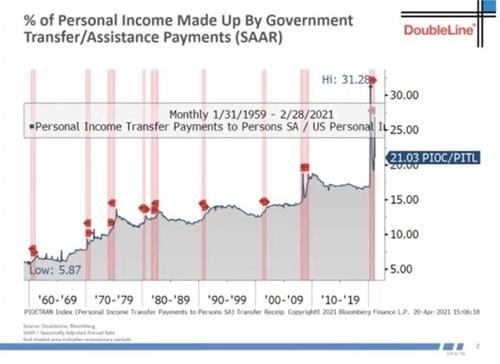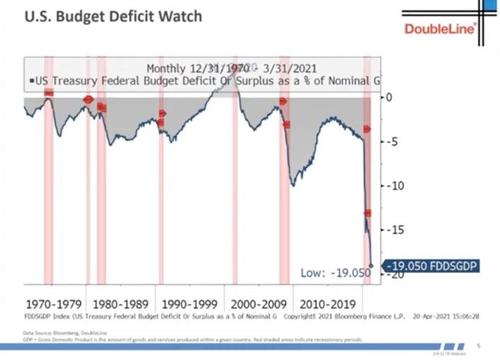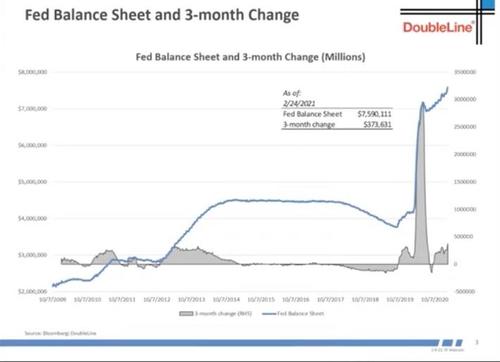Gundlach Warns America's "Unfunded Liabilities" Are $163 Trillion, More Than 5x National Debt


ZeroHedge - BY TYLER DURDEN, MAY 06, 2021 - 05:30 PM
DoubleLine's Jeffrey Gundlach called the Fed's bluff late last month, telling investors during an interview that he suspected the central bank was merely "guessing" about the impact of inflation being "transitory".

Since then, we have only received more signs that inflationary pressures are growing in the US economy, while a growing number of investors have been persuaded to agree with Gundlach.
The other day, DoubleLine released a recording of another talk given by Gundlach where he elaborated on the inflation theme, while also discussing other issues like the outlook for the US dollar in the face of President Biden's tax-and-spend agenda.
During the course of an hour-plus conversation, much of it accompanied by a slide deck with some of Gundlach's favorite charts, Gundlach tackled a few key topics that he feels could threaten the Fed's ability to backstop financial markets.
He started by slamming Biden's plan to hike capital gains taxes on taxpayers with more than $1 million in earnings, arguing that fears of higher capital gains taxes is already weighing in the market.
Gundlach argued that high-beta stocks and other speculative investments like bitcoin have the most to lose due to a hike in capital gains. After all, who is going to want to take a risk on a long shot if they need to give half of their winnings to the government?
"Today is an important day because the president has made good if you want to call it that on his promise to begin raising taxes and the capital gains tax if you make more than a million dollars a year in California the capital gains tax if the proposal goes through that was launched today will be 57 capital gains tax that's the federal tax plus the California tax so it's getting pretty ugly and i think it's going to have some very significant effects which we started to see the minute that this tax proposal was was launched today we've seen bitcoin a very speculative darling investment these days go down about 20 from its high in the last couple of weeks and obviously a lot of people would think twice about speculating on something like bitcoin if they felt that if they won meaning the price went up from their cost that 57 percent of a highly speculative gamble if it hits if it hits would go to the federal government but the stock market also fell pretty sharply upon that no wonder it's surprising that people haven't been contemplating this already."
He then launched into his criticism of the federal government's embrace of an MMT-like monetary policy fusing fiscal spending and monetary stimulus to try and paper over the economic damage caused by COVID-19.

Between the stimulus checks, which were supposed to be temporary, and all the expansions of unemployment and other benefits, the percent of personal income comprised of government payments soared, something we also saw in recent spending data when we observed that 34% of household spending last month came from the government.
"A lot of weird things happened once the pandemic hit....it was a steady march to dependency on the government by a larger and larger fraction of the US population went absolutely vertical what this chart represents is what percent of personal income which is a government statistic what percentage of government of of personal income is made up of government giveaways which we call transfer payments back in the 60s it was down near five percent."
The trillions in Congressionally-approved payments caused the deficit, already blown out under President Trump, to widen further.

While the Fed's balance sheet exploded as the central bank monetized much of the new debt.

Gundlach also pointed out that the surge in the debt doesn't fully capture how much money the federal government owes. There are also unfunded liabilities which, when combined with all local, state and federal debt, leave US citizens on the hook for $163 trillion. That's more than 5x the $28 trillion national debt
"The government giveaway programs and the programs that we put in place to battle the economic impact especially to people who were suddenly unemployed and there were about 20 20 uh 20 million people that were suddenly unemployed those stimulus packages were originally thought to be temporary but now they've become a fixture and we can see that the blue line in recent months has needed uh as has grown again as a requirement in funding these non-stop stimulus programs so the US government is now has over 28 trillion dollars in debt and the US government has $163 trillion in unfunded liabilities when you roll it all together federal state uh and local level that amount of unfunded liabilities is 775% of our current total economic output," Gundlach said.
If we wanted to pay that off, Gundlach observed, it would have to put 10% of our economy, and have negative economic growth, for 77 and a half years. In other words, there's no feasible way the US will be able to pay off its debt. Instead, the US has no choice but to continuously refinance.
Moving ahead, Gundlach of course touched on one of the most important topics in contemporary markets: inflation. Earlier on Thursday, the Dallas Fed chief Robert Kaplan came out and said he wants the Fed to talk about tapering its asset buys sooner rather than later, saying the economy has improved faster than expected, and citing worries about "excesses and imbalances" in the market, a reference to frothy prices in everything from equities to housing.
Gundlach cited the Fed's failures to anticipate the collapse of the subprime mortgage market as one reason to be skeptical of Fed Chairman Jerome Powell's rhetoric about rising inflation being "transitory".
"It's quite likely that we're going to see this inflation rate going up now the Federal Reserve has been transparent saying that they're not worried about it they think an inflation increase would be transitory. How do they know that? How do they know that the inflation rate going up is just going to be transitory? I'm reminded of the subprime banking crisis that started in 2006 really 2007. It started and Ben Bernanke was the chairman of the Federal Reserve and Ben Bernanke said don't worry about the subprime loan problem that we have subprime is contained well housing prices fell all over the country by an average of 35 percent so it wasn't contained so since the federal reserve did not have the crystal ball accurate about subprime being contained I'm not going to accept that their crystal ball is any clearer on this inflation up move being transitory. We'll see um it is true that we will probably have higher inflation in the middle of 2021 than at the end of 2021 because it does have some input things I'm not going to get into it it's fairly esoteric but the inflation trend seems to have reversed a lot of trends."
Readers can watch the full presentation below:
NEVER MISS THE NEWS THAT MATTERS MOST
COPYRIGHTS
Copy & Paste the link above for Yandex translation to Norwegian.
WHO and WHAT is behind it all ? : >
The bottom line is for the people to regain their original, moral principles, which have intentionally been watered out over the past generations by our press, TV, and other media owned by the Illuminati/Bilderberger Group, corrupting our morals by making misbehaviour acceptable to our society. Only in this way shall we conquer this oncoming wave of evil.
Commentary:
This is an obvious communist trick to gather low paid workers, denying labour for small/middle sized businesses, preventing their growth and causing banruptcies.
Administrator
HUMAN SYNTHESIS
All articles contained in Human-Synthesis are freely available and collected from the Internet. The interpretation of the contents is left to the readers and do not necessarily represent the views of the Administrator. Disclaimer: The contents of this article are of sole responsibility of the author(s). Human-Synthesis will not be responsible for any inaccurate or incorrect statement in this article. Human-Synthesis grants permission to cross-post original Human-Synthesis articles on community internet sites as long as the text & title are not modified.